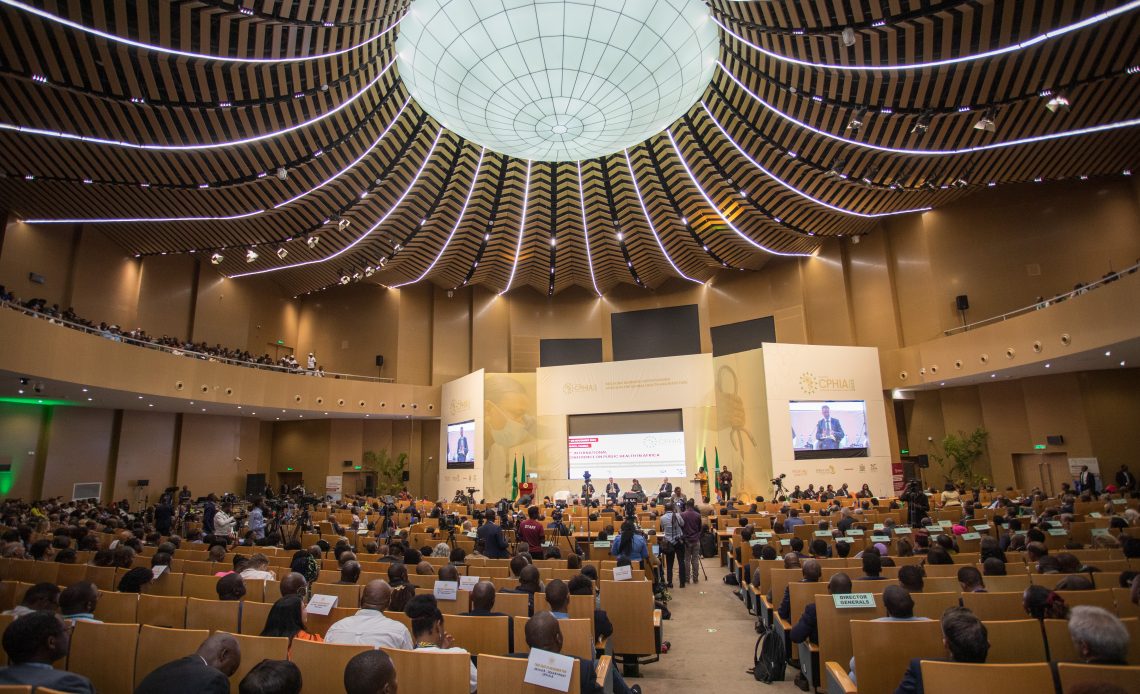The International Conference on Public Health in Africa (CPHIA) 2023 kicked off in Lusaka, Zambia, on 27th November 2023 with a resounding commitment to breaking barriers and repositioning Africa in the Global Health Architecture.
In his opening remarks, Dr Jean Kaseya, Director General of Africa Centres for Disease Control and Prevention (Africa CDC) said, “Breaking barriers go beyond traditional methods of healthcare delivery; it challenges us to redefine our position in the global health architecture for a healthier and more prosperous continent”. While his vision for achieving this rested on five Cs – Community, Connectivity, Capacity, Collaboration, and Climate, Kaseya stressed the pivotal role of communities as the backbone of public health efforts. He emphasised the importance of engaging diverse stakeholders, including parents, health workers, and community leaders.
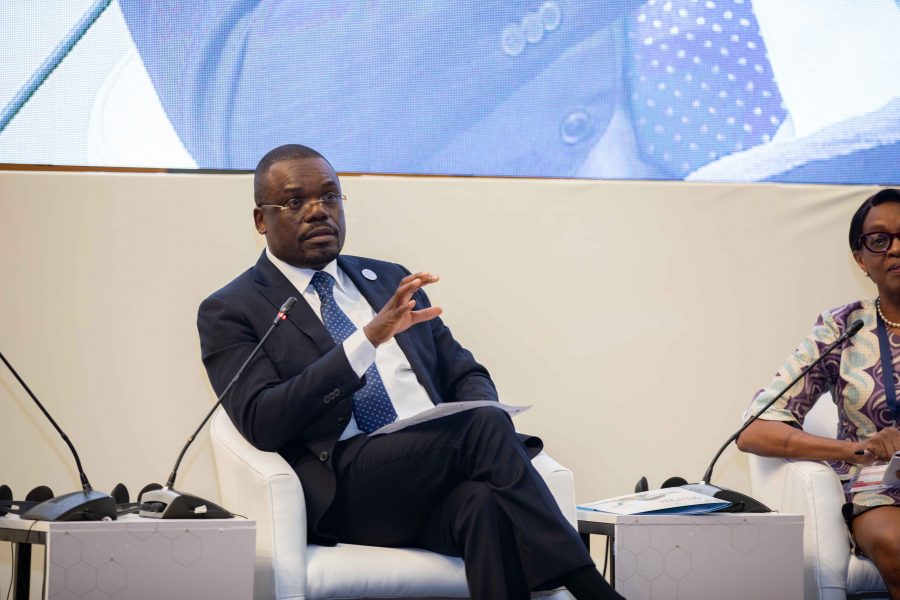
Connectivity emerged as a central theme in reshaping Africa’s health landscape, with Kaseya highlighting the transformative potential of digital technology. “We must tap into this potential to create a resilient health system in Africa,” he told the over 5000 delegates attending the conference. But to build this resilience, there’s also a need for a skilled, well-equipped, and committed workforce.
Rewarding excellence and leadership
There was a lot of celebration and excitement during the opening ceremony when Dr. Tedros Ghebreyesus, Director General of the World Health Organisation (WHO) received the CPHIA 2023 Lifetime Achievement in Public Health Award. It was in recognition of his leadership and commitment to promoting equitable access to healthcare for all and tackling emerging health threats. During a standing ovation, President of the Republic of Zambia, Mr. Hakainde Hichilema, and Prime Minister of Namibia, Dr. Saara Kuugongelwa, presented Dr. Tedros with the Award.

The conference began with a pronounced emphasis on the themes of leadership and partnership, with their significance echoing prominently throughout the opening ceremony. Consolidating these efforts to achieve Africa’s New Public Health Order will require strong partnerships, said Dr Tedros Ghebreyesus, Director General of the World Health Organisation (WHO). “Building strong public health institutions in Africa requires partnerships across the globe. If there is a political commitment from all our African leaders, anything is possible,” he said. The President of the Republic of Zambia, in his remarks, went on to further express optimism that CPHIA 2023 would transition Africa from discussions to concrete implementation. “Now is the moment to dedicate ourselves to the diligent efforts required to realise our goals,” he said.

Effective leadership can drive local solutions
During the plenary session “Pandemic Preparedness and Resilient Financing Mechanisms for Africa,” thought-provoking conversations around African-led solutions to address African problems were discussed. Hon. Dr. Sabin Nsanzimana, Minister of Health, Rwanda, emphasised the importance of effective leadership guided by science and evidence. He also stressed that pandemic preparedness and resilient financing required community engagement and media involvement.
The African continent remains very vulnerable to infectious diseases, Dr. Merawi Aragaw Tegegne, Head of Surveillance and Disease Intelligence at Africa CDC, underscored the need for collaborative efforts in strengthening healthcare systems and promoting resilience to address disease threats. However, convenings like the CPHIA provide a unique opportunity for unified action against infectious diseases, said Dr. Matshidiso Moeti, WHO Regional Director for Africa. She acknowledged the strides made in emergency response during the recent pandemic, however cautioned that there is still a long journey ahead. Dr Kaseya stressed the importance of strong leadership, urging countries to prioritise financing their emergency preparedness programmes before seeking donor funding. He highlighted the critical need to scale up local manufacturing, referring to it as Africa’s “second independence”.
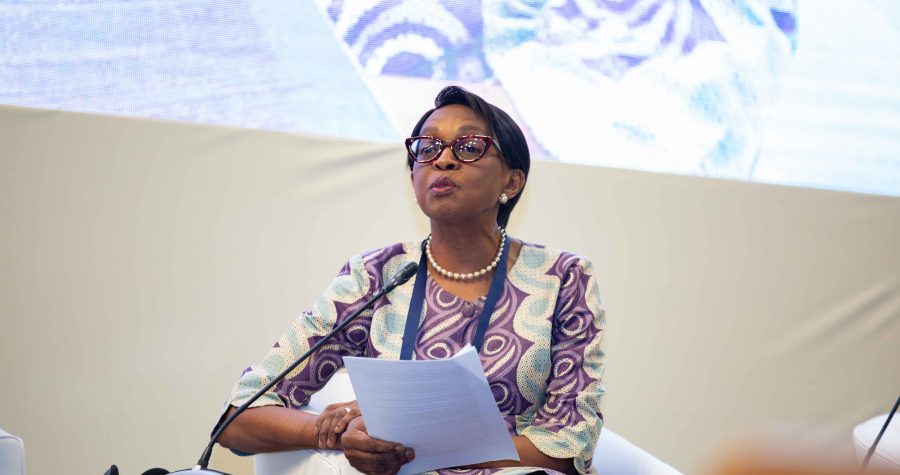
Repositioning Africa
During a special Ministerial Session themed “Transformative Leadership for Health in Africa,” Ambassador Lewis Brown, a former Minister of Information, Cultural Affairs and Tourism in Liberia gave a keynote speech. He emphasised issues the Liberian health system is faced with, including the brain drain of health workers and limited investments in health. He mentioned that “repositioningAfrica is positioning an enabling learning environment for training young people in medicine and sciences to help address the brain drain. He went on to say that “a health system where African leaders do not leave their countries for other African countries for medical check-up and treatment”.
He therefore called on African leaders to invest in health by creating an enabling environment and strengthening the existing health systems. Being a health workforce powerhouse means we must invest in health system strengthening, stressed Ambassador Brown. He discussed the need to strengthen African agencies without compromise. His strong call to action was for everyone to be advocates in their countries and communities.
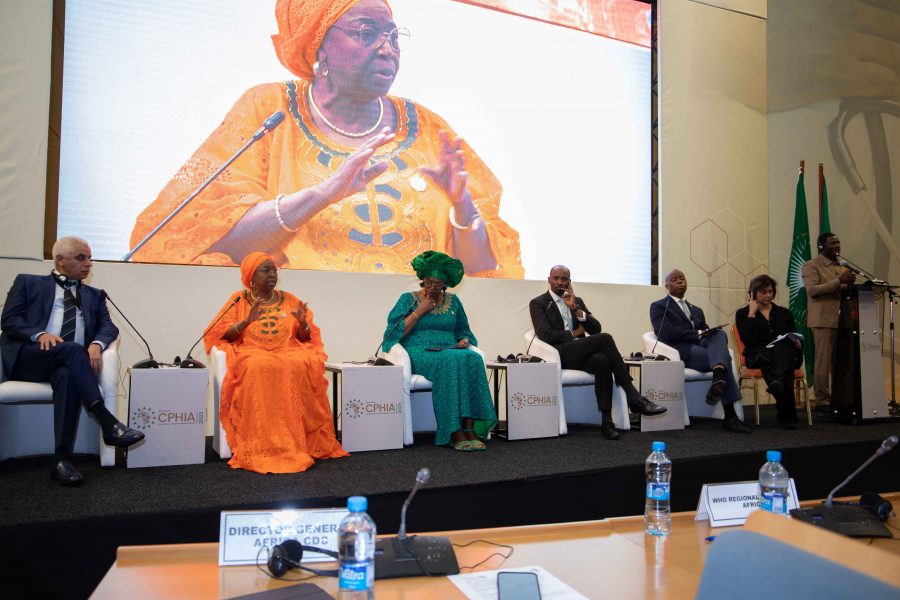
Zambian Minister of Health, Hon Sylvia Masebo emphasised the need for political will and multi-sectoral collaboration as essential tools to ensure equitable health delivery on the continent. “Political will is required for building sustainable health systems,” she said. The Minister of Health Senegal, Awa Marie Coll Seck highlighted the need for youth involvement and providing an equitable platform for educating women and girls to enable them to grow into healthcare leadership roles. “We need to invest in women and girls by building their capacity and trust our youth to lead health systems and service provision adequately,” Seck said.
Leveraging digital innovations to improve health outcomes
Discussions that were focused on unleashing digital innovations centred on key enabling and limiting factors for the scale-up and sustainability of digital health innovations on the continent. Sharing why digital health innovations are not scaling in Africa, Abimbola Adebakin, founder and CEO of Advantage Health Africa and co-chair of the CPHIA track Transforming Health in Africathrough Digital Innovation, stated that there is inadequate capacity of health tech start-up founders to communicate in a language that investors understand. This involves communicating both profit and impact. Panellists collectively agreed that there is an overreliance on donor funding, and the continent is still yet to leverage the private sector adequately. Adebakin emphasised that public-private integration and partnerships must become seamless, and bureaucracies eliminated because private sector actors do not have the bandwidth for long, drawn-out processes that slow them down.

Panellists also discussed the need to ensure that innovations are driven by the felt needs of the targeted communities. Ms Ngasuma Kanyeka, a Doctoral Candidate at Harvard T.H. Chan School of Public Health, emphasised that the most important need of young people whom digital innovations mostly target is to escape poverty, a significant social determinant of health. Digital health innovations cannot operate in isolation, and cross-sectoral interventions have the potential to make a significantly greater impact. She also emphasised the need to communicate in a way that resonated with the public, as health can be monotonous. Drawing lessons from her work in understanding the anti-vaxxer movement and using Artificial Intelligence to combat mis- and dis-information.
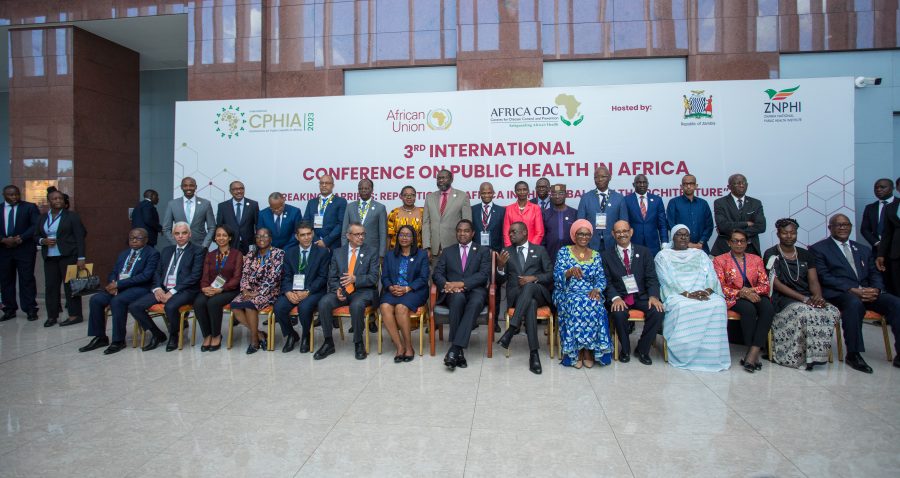
Breaking barriers and forging ahead
As the conference continues, the resonating themes of unity, innovation, and resolute determination continue to echo within the conference halls. As delegates delve deeper into discussions and collaborative sessions, the promise of forging robust strategies, fostering stronger partnerships, and amplifying actionable solutions remains achievable.
The energy at the conference in Lusaka reflected the steadfast commitment to breaking barriers and reimagining Africa’s role in the global health landscape. However, it is not merely about dialogues; it is about charting a collective course toward a future where health equity is more than an aspiration—it is an attainable reality.


